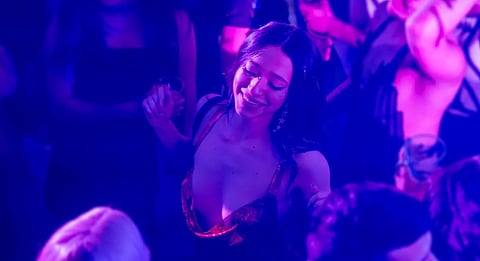

This year’s Palme d’Or winner, Sean Baker’s Anora, made me take a 180-degree turn in my response to it, through the 139 minutes of the run time. Initially, the endless scenes of young New York sex worker Anora aka Ani (Mikey Madison), serving the clients gets extremely exhausting and distressing to process, with Baker going wildly brazen with his camera’s unswerving carnal attention, leaving absolutely nothing to the viewers’ imagination.
Is he pandering to the intrinsic voyeur in the prurient viewer? Or is he exposing and taking down the sheer grotesquery and exploitation that the sex workers must go through every day in the line of duty? Even as you stay conflicted—equal measure drawn into the world of stripping clubs and disturbed by their reality—the narrative flows on and lodges you right in the middle of a wacky romance between Ani and Vanya (Mark Eydelshteyn) the kooky son of a Russian oligarch that leads on to elopement and a fairy tale wedding.
But all does not quite end well. Ani is no Cinderella to have found her Prince Charming in Vanya. His parents send a bunch of goons to annul the wedding and threaten to descend on New York themselves as the film’s tone undergoes a radical change yet again. Mayhem is let loose as Garnick (Vache Tovmasyan), Igor (Yuriy Borisov) and their boss Toros (Karren Karagulian) try hard to tame a wild Ani and desperately seek to trace the missing Vanya who has run away from their clutches.
Baker’s script goes bonkers in a most fascinating, funny way in this protracted comic sequence in the middle of the film. Delightful lines are delivered spot-on with perfect comic timing by a wonderfully in-sync ensemble. However, it’s not just about playing to the gallery. One of the most glorious slapstick sequences, which I’d put right up there in my top favourites, turns out to be about more than just the laughs. It's about slowly making the audience warm up to the supposed rogues. Be it the cocksure, intrepid, and self-assured Ani or trigger-happy and beefy Igor and Toros, they all are eventually vulnerable. In keeping with Baker’s oeuvre, every character is situated on the margins and the film makes you empathize with and care for the misfits. The ones here also sport hyphenated cultural identities, migrants or children of migrants to America.
Mikey Madison’s Ani, seemingly steel but deeply sad, makes for a staggering performance of myriad moods which deserved the best actress award in my book. Karren Karagulian is a riot as the perennially befuddled and perplexed Toros but it’s the delicate play of love for Ani on Igor’s face that had my heart go all squishy for Yuriy Borisov who many indie buffs will remember seeing last in Compartment No 6.
One of my last abiding moments from the Cannes Film Festival this year was the heated debate among critics witnessed on the bus ride back from Cannes to Nice airport. One set was rooting for Anora, calling it a modern classic, another questioning its gaze on women, outraged at it being given the top award in the post-MeToo era, that too by a jury led by Greta Gerwig.
I could well see merit in arguments from both sides while admitting to myself that the film’s last shot, of Ani, habituated to taking everything in her stride, finally letting her guard down, holding Igor in a tight clasp, seeking comfort in a fellow outlier, is one of the most moving shots witnessed in Cannes this year. It made the film for me.
From disgust to laughter to tears, Baker audaciously makes you traverse an entire range of emotions. But it is that one last shot that eventually makes it a humane statement championing the lives that get invisibalised in big cities and don’t often get acknowledged in cinema.